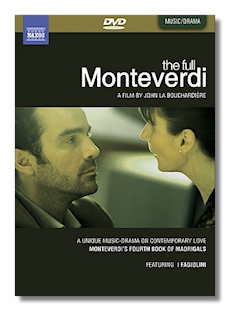
The Internet's Premier Classical Music Source
Related Links
- Monteverdi Reviews
- Latest Reviews
- More Reviews
-
By Composer
-
Collections
DVD & Blu-ray
Books
Concert Reviews
Articles/Interviews
Software
Audio
Search Amazon
Recommended Links
Site News
 DVD Review
DVD Review
The Full Monteverdi

A film directed by John La Bouchardière
Based on Claudio Monteverdi's
Fourth Book of Madrigals
I Fagiolini/Robert Hollingworth
Naxos DVD 2.110224 60:00 Full Screen Dolby Digital DTS
Did you ever have the experience of sitting in a restaurant and overhearing, without meaning to (at least at the start!) a couple's intimate conversation at a nearby table? Perhaps it was their first date or their anniversary, or perhaps they were heading for a break-up. Director John La Bouchardière decided that a viable way of presenting Monteverdi's love madrigals as dramatic works was to do something very similar to this. Collaborating with vocal ensemble I Fagiolini and their director Robert Hollingworth, La Bouchardière placed his live audience in a virtual dining room. The singers were spread over the room at separate tables, and each was paired with a non-singing, non-speaking actor or actress, who played the role of his lover. In this manner, the abstract quality of Monteverdi's madrigals – and the emotions therein – was made concrete.
Apparently, audiences loved the idea, and so a film version was created, and that is what is offered here. Of course we're not sitting in a restaurant as we watch The Full Monteverdi, but the camera takes us around the room, and also opens up the action by taking us into the characters' living spaces and other surroundings. The singing was pre-recorded, and the filming occurred later, with the singers mouthing to playbacks, Bollywood-style. In the booklet that accompanies this CD, La Bouchardière discusses different filming techniques he used to complement the action, such as it is: fixed vs. hand-held cameras, tinted lenses, and so on.
Monteverdi's fourth book of madrigals is unlikely to have been conceived as a cycle by the composer. No story is being told – or rather, 19 stories are being told. Stringing them together and performing them in the context as a drama neither harms nor hurts them. About this production's musical values I have very few reservations. I Fagiolini (an English group, despite its name, which is "the green beans") sing these madrigals passionately, and the members are more than fair actors, although I wondered if perhaps baritone Matthew Brook were emoting a little too much. Performing The Full Monteverdi live, the singers were separated, remember, and received a pitch only once: at the beginning of the show. Anyone who has performed madrigals (not just Monteverdi's) will tell you what an accomplishment that is. For this film, of course, these challenges were removed, but I still have nothing but admiration for I Fagiolini, and for the polish and emotional punch of their singing.
The bad news is that this film simply does not work for me. I don't find it emotionally compelling at all. Instead, it makes me feel as if I am watching a soap opera with the volume turned down and a Monteverdi CD playing instead. Joining them in medias res, we don't know who these characters are, and, sad to say, we don't know them much better an hour later, and so it is difficult to care about them. This makes watching The Full Monteverdi feel particularly voyeuristic, and not even in a naughtily appealing way. Watching it with the English subtitles worsens the problem, because then it is made clear to us that what the singers are singing to themselves and to their partners usually has little to do with what is happening on screen, except in a very general sense. Performed live, The Full Monteverdi might be effective, to a degree, because of its gimmickry, and also because it is hard not to be impressed by the technical risks faced by the singers. On film, however, those features are gone, and the visual element that remains is merely distracting.
I assume the awful title of this show was a play on The Full Monty, which also is English slang for going all the way, and not just sexually. In Hollingworth's booklet note, he quotes an English critic, who said, "You could live to be 150 and still not know the 'full' Monteverdi." After having seen The Full Monteverdi, I am not any closer!
Copyright © 2008, Ray Tuttle




















